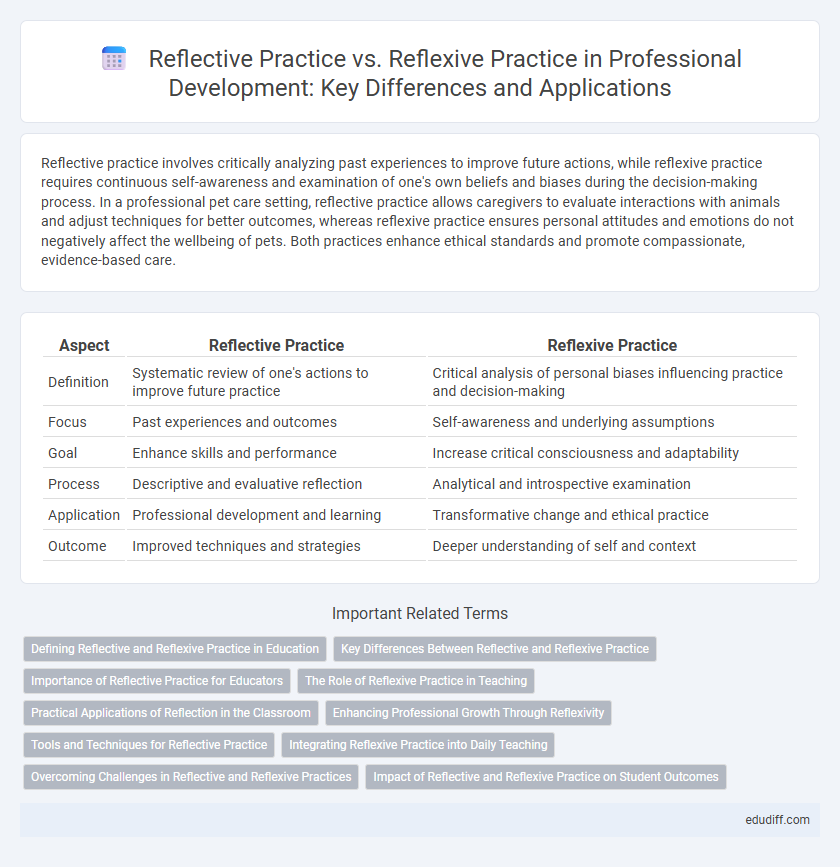Reflective practice involves critically analyzing past experiences to improve future actions, while reflexive practice requires continuous self-awareness and examination of one's own beliefs and biases during the decision-making process. In a professional pet care setting, reflective practice allows caregivers to evaluate interactions with animals and adjust techniques for better outcomes, whereas reflexive practice ensures personal attitudes and emotions do not negatively affect the wellbeing of pets. Both practices enhance ethical standards and promote compassionate, evidence-based care.
Table of Comparison
| Aspect | Reflective Practice | Reflexive Practice |
|---|---|---|
| Definition | Systematic review of one's actions to improve future practice | Critical analysis of personal biases influencing practice and decision-making |
| Focus | Past experiences and outcomes | Self-awareness and underlying assumptions |
| Goal | Enhance skills and performance | Increase critical consciousness and adaptability |
| Process | Descriptive and evaluative reflection | Analytical and introspective examination |
| Application | Professional development and learning | Transformative change and ethical practice |
| Outcome | Improved techniques and strategies | Deeper understanding of self and context |
Defining Reflective and Reflexive Practice in Education
Reflective practice in education involves critically analyzing one's teaching experiences to improve future instructional strategies and student outcomes. Reflexive practice goes deeper by examining the underlying beliefs, values, and power dynamics that influence educators' decisions and interactions in the classroom. Both practices are essential for fostering continuous professional growth and enhancing educational effectiveness.
Key Differences Between Reflective and Reflexive Practice
Reflective practice involves critically analyzing one's actions and experiences to improve future performance, emphasizing self-awareness and learning from past events. Reflexive practice goes further by examining the underlying assumptions, power dynamics, and social contexts influencing those actions, encouraging ongoing adaptation and transformation. Key differences include reflective practice's focus on personal insight versus reflexive practice's broader scrutiny of external factors shaping behavior.
Importance of Reflective Practice for Educators
Reflective practice is crucial for educators as it fosters continuous self-evaluation and improvement of teaching methods, leading to enhanced student outcomes and professional growth. By systematically analyzing their experiences, educators develop deeper insights into their instructional strategies and classroom management. This process supports adaptive learning environments and promotes evidence-based decision-making essential for effective teaching.
The Role of Reflexive Practice in Teaching
Reflexive practice in teaching entails educators critically examining their own beliefs, assumptions, and biases to adapt instructional strategies effectively. This continuous self-awareness fosters a deeper understanding of student needs and promotes inclusive, responsive pedagogy. Emphasizing reflexivity enhances professional growth by encouraging teachers to challenge conventional methods and innovate classroom interactions.
Practical Applications of Reflection in the Classroom
Reflective practice in the classroom encourages educators to critically assess their teaching methods and student interactions to improve learning outcomes and adapt strategies to diverse learner needs. Reflexive practice goes deeper by examining how teachers' beliefs, values, and social positions influence their pedagogical choices and classroom dynamics. Implementing both practices fosters a responsive educational environment that promotes continuous professional growth and enhanced student engagement.
Enhancing Professional Growth Through Reflexivity
Reflexive practice deepens professional growth by encouraging ongoing self-examination of personal biases, assumptions, and decision-making processes within specific contexts. This continuous critical analysis fosters adaptive learning, enabling professionals to respond effectively to complex, evolving challenges. Embedding reflexivity in workplace routines enhances self-awareness and drives meaningful improvements in skills and behavior.
Tools and Techniques for Reflective Practice
Reflective practice utilizes tools such as journaling, structured reflection models like Gibbs' Reflective Cycle, and peer feedback to critically analyze experiences and improve professional skills. Techniques including self-assessment questionnaires and video recordings enable practitioners to identify strengths and areas for development systematically. These methods foster continuous learning and informed decision-making in professional settings.
Integrating Reflexive Practice into Daily Teaching
Integrating reflexive practice into daily teaching enhances educators' ability to critically examine their assumptions, biases, and the contextual influences on their instructional strategies. Unlike reflective practice, which often involves looking back at past experiences, reflexive practice requires ongoing self-awareness and adaptability during real-time classroom interactions. This continual process fosters a dynamic learning environment where teachers actively adjust methods to meet diverse learner needs and promote deeper engagement.
Overcoming Challenges in Reflective and Reflexive Practices
Overcoming challenges in reflective and reflexive practices requires active engagement in self-awareness and critical analysis to identify personal biases and blind spots. Structured feedback mechanisms and peer collaboration enhance the depth of insight and promote continuous improvement in professional settings. Emphasizing deliberate practice enables professionals to adapt strategies effectively, fostering resilience and growth within complex environments.
Impact of Reflective and Reflexive Practice on Student Outcomes
Reflective practice deepens student learning by encouraging critical analysis of experiences, leading to improved problem-solving skills and academic achievement. Reflexive practice fosters awareness of personal biases and contextual influences, enhancing students' ability to adapt and engage meaningfully in diverse learning environments. Both approaches positively impact student outcomes by promoting self-regulation, metacognition, and a growth mindset essential for lifelong learning.
Reflective Practice vs Reflexive Practice Infographic

 edudiff.com
edudiff.com